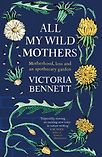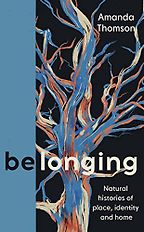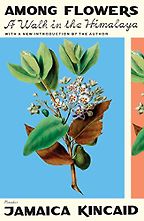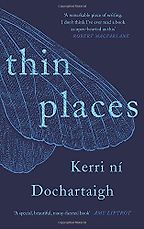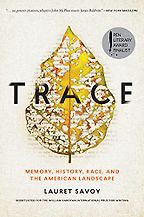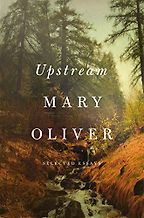Why are you attracted to the genre of nature memoir? What do you think reflections on or descriptions of the natural world bring to a personal story?
For me, nature is intrinsic to our experience of being alive. I don’t think I consciously decide I will read a book because it is a ‘nature memoir’ any more than I saw my own writing as sitting within the nature writing genre! It is more a case of finding that I connect with writing which locates me within the natural world, and I connect with myself through the natural world. I think that allowing space to slow down and inhabit nature, from an intimate perspective, offers an opportunity to re-see our own place in the bigger picture, and reaffirm our relationship with ourselves, and with the world we live within.
In your own book, All My Wild Mothers, you plant an apothecary garden & process your grief after the death of your sister. Can you talk a little about what those plants and herbalist lore came to mean to you?
When I began writing—and planting—there was nothing but the newly sown grass and deep layers of rubble and waste in the garden. This barrenness and resistance of this ground expressed the grief I felt far more closely than a beautiful and pristine garden would have done. Even so, I wanted to see what could grow. It was a need really: to balance the repeated experience of loss with the persistence of life. I found that, with each plant that grew, I healed a little of that broken ground, both within myself and in the garden. In doing so, I discovered that it was the very imperfectness of the ground and the resilience of the wildflowers that made that growth possible.
“For me, nature is intrinsic to our experience of being alive”
Part of the process of creating the garden was learning about the plants that grew. Because I was creating the garden with my young son, every aspect of the experience was seeded with magic. Together, we learned about the botanical and medicinal properties of the plants, and also the plant lore behind each one. As my knowledge deepened, I came to understand each plant as part of my own story, and integrate them into my daily life through the creation of teas and balms, through using them in my daily creative practice, and through being part of that habitat. So the garden was an apothecary garden, not just in providing me with a cabinet of cures, from which I drew on daily, but also in the physical act of creation and being – the garden was a healing garden in every sense.
In this slow growing, the garden became a conversation, which is echoed in the structure of the book. It became a memoir in itself: recording memories of discovery, of time passing, childhood disappearing, my own ageing body, and the losses that I grieved.
The first book you’ve chosen to recommend is Amanda Thomson’s Belonging: Natural Histories of Place, Identity and Home. Would you tell us about it, and why you admire it?
Belonging is a beautiful book and also a creatively rich one. Thomson uses language as an evocation of place, and an invocation of something beyond the veil—a naming and calling down into being, if you will. It is a conjuring of place through language and landscape, revealing the connections and fragmentations it holds as it explores what it means to belong in and of a place, and the creative relationship we have with the natural landscape as artists. It is a thinking book, but it is also a meditative book of space and silence and the delicacy of feathers that asks us to be still and quiet and observant, even as the world around rushes by. As Thomson says, ‘this is what belonging is really about. It is about noticing and caring, and taking stock’.
Next you’ve chosen Jamaica Kincaid’s Among Flowers: A Walk in the Himalayas. It is part travel book, part memoir, full of meditations on nature and descriptions of the spectacular Nepali scenery. Tell us more.
At the beginning of the book, as Kincaid is leaving to go in search of the elusive meconopsis (Himalayan poppy) in Nepal, she tells us she ‘had the strange sensation that I might be seeing everything in the way I was seeing it for the last time’. This sense of the journey being significant is reiterated in the repetition of the phrase, ‘I left my home’.
Although the book begins with the appearance of it being a writing assignment—to go somewhere and write about it—there is a sense from the start that this is much more than that, and that this journey is life-changing. The beauty of this book is in the richness of the writing and observation, which is hardly surprising for a writer of Kincaid’s skill, but it is also a call for us to re-see, to re-enter the world around us. Kincaid brings to the writing a gardener’s eye, and language, using plant names to open up this strange yet familiar landscape.
One of my favourite lines, that I kept above my desk when working on All My Wild Mothers, is Kincaid’s observation of rhododendrons, in which she is ‘reminded again that every weed can be made into a treasure in the right circumstance’.
Five Books interviews are expensive to produce. If you're enjoying this interview, please support us by donating a small amount.
It is a quiet book that asks us to re-see the natural world and its beauty, not in a grand way—in Kincaid’s walk it is the small flowers that are noticed not the immense landscapes—but in an intimate way, so that the awe we might feel in these strange and unknown places might equally be felt in our own back yards. The etymological root of respect is ‘to look back upon, to re-see’, and for me, this is what Among Flowers asks us, as readers and as people, to do.
Your third recommended nature memoir is Thin Places by Kerri ni Dochartaigh, which has been highly acclaimed. Ni Dochartaigh grew up on the border of Ireland and Northern Ireland during The Troubles, with a Catholic mother and a Protestant father. What does nature bring to this book?
Thin Places is an exploration of boundary lines, definitions, delineations. We come up against hard edges, places of pain and wounding in which the human world, with its need to divide and claim, leaves its scars. Yet these scarred places are also places where the veil is thinnest. They are places to pass through, like the cracks in the Leonard Cohen song. There is a beautiful description of swimming with her father and listening to the curlew’s call above: “By the time my father and I reached the water’s edge, where our bodies met the outline of the world, where the waves met the land, another borderline had been wiped off the map.” This ability to pass through what separates us, and find connection, is captured with such delicacy in this book, so that the rawness of it is tempered by a sense that we are part of a larger, longer story. Nature, and connecting with nature, offers us a way of transcending, or perhaps incorporating, these divisions, so that we can see beyond them and find the commonality and connection that underlies them. And therein lies hope—not complacent, but fragile, and in need of continual renewal.
Can you tell us about your next nature memoir recommendation, which is Trace: Memory, History, Race, and the American Landscape, by Lauret Savoy?
I am fascinated by the way in which landscape holds the narratives of our absence, leaving behind the traces of our presence to tell our stories. Trace is a complex and beautiful book. Savoy explores questions about identity, race, access, and what it means to belong, through the stories that are held in the land. There is a need to name the landscape—what shapes and scars it—to reclaim its language so that these stories can be told because: “Once given breath, the names incanted spells.”
This is what I love about this book. It is at once forensic and expansive, intimate and urgently political. Here, the natural landscape is both surrounding us, and part of us—its stories intrinsically part of our own, and vice versa: ‘The past and its landscapes lie close. They linger in eroded, scattered pieces, both becoming and passing into what I am, what I think we are.’
That brings us to Mary Oliver’s Upstream: Selected Essays. I know her poetry, of course, but not her nonfiction writing; why do you recommend this book?
As with all the books I have chosen, there is a commonality of a moment where one feels not outside of the world, but part of it—and a shared wanting to re-find the moment of connection, driven by a yearning to experience that sense of belonging. I chose Upstream because Mary Oliver brings the poet’s eye and sound to her non-fiction. There is a call to be present, to be part of this natural world in the way a child is able to be; to “see it and hear it and react to it, before I knew at all who I was, what I was, what I wanted to be.” This desire to return to a more weightless state of being before the “heavy coats” of adulthood claim us.
Upstream has the attention and urgency of a poet’s voice. It is a meditation on the natural world, but also a clarion call. In it, Oliver implores us to “teach the children … show them daisies and the pale hepatica … head them upstream, rejoice as they learn to love this green space they live in, its sticks and leaves and then the silent, beautiful blossoms.” Of course, this is as much a call to us as adults, in our own lives: the need to see and name and be part of the natural world, to be observant and engaged, to learn its language and its music, to let it enter our being and change us, so that we can see ourselves not as isolate and alone, but as part of something much bigger, connected to all living things. Because, as Oliver says, “Something is wrong, I know it, if I don’t keep my attention on eternity.” And the place to discover it, is in the smallest flower and seed.
Were there any other titles you wanted to mention but couldn’t fit in?
Too many! Recently, I have loved reading Rural: The Lives of the Working Class Countryside, by Rebecca Smith—out in June this year. I came across Rebecca’s writing a few years back, when she was a guest on the ‘Wild Woman Web‘ project that I curate. I found this book a fascinating and relevant read, not just for the wider conversation it engages with, but also because it spoke of my own experiences, and that of my family, who have their roots in the rural working-class world of mining and agriculture, and were forced out of their homes because of poverty. I have experienced the other side of rural life, living in social housing in a landscape where chocolate-box tourism is what most people know, and the precarity of rural living without the privilege of money or home ownership. Rural is a timely and urgent demand for attention, but it is also a celebration of the working landscape and the extraordinary ordinary life.
Interview by Cal Flyn, Deputy Editor
April 29, 2023
Five Books aims to keep its book recommendations and interviews up to date. If you are the interviewee and would like to update your choice of books (or even just what you say about them) please email us at [email protected]

